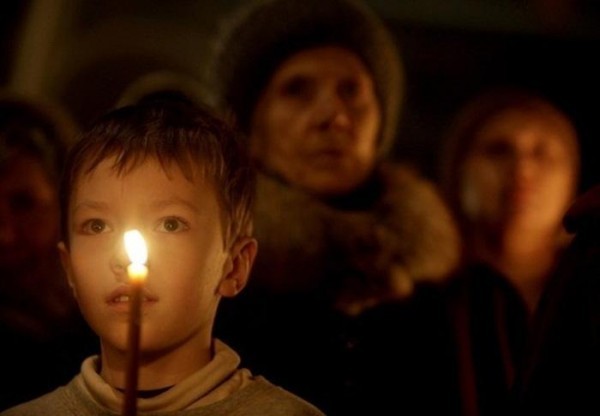What does it mean to be spiritual? The world knows and promotes all kinds of “spiritualities” related to music, art, nature, leisure, sports, and many other kinds of human activities, including religious and quasi-religious practices. Many such activities are fairly harmless and promote a sense of physical and emotional well-being. Others however may involve obsessive preoccupations with popular music, sports or other forms of entertainment, and may actually be quite harmful, such as in the case of experimentation with drugs.
For Orthodox Christians, being spiritual has to do with ordinary Christian living based on faith in God as we know Him in the person of Christ and by the power of the Holy Spirit. For an Orthodox Christian, the first thing about being spiritual is not to dare think that you are spiritual but only humbly to seek to live by your faith in Christ and His teachings. Faithfulness, humility, discernment, peacefulness, love, truthfulness, compassion, and inner joy are the primary attributes of Orthodox spirituality.
Orthodox spirituality is a quality of life that is always anchored and grows out of Orthodox piety. Orthodox piety is a way of life defined by observance of the ordinary expressions of Orthodox Christian life: regular worship, prayer at home, lighting and offering a candle, baking and offering the prosforo, fasting, philanthropy, celebrating the feast days of the liturgical calendar, reading the Scriptures and the writings of the Church fathers, serving in one of the Church ministries and services, and above all, fervent faith in Christ and whole-hearted obedience to His teachings. An Orthodox Christian can never cease doing the works of Orthodox piety, or somehow circumvent them, or think to rise above them, and still think that she or he can make progress in spiritual life.
Spiritual growth occurs by reliance on God’s grace and attentiveness to practicing and living by the full meaning of the acts of piety and so to transform, by the grace of the Holy Spirit, Orthodox piety into Orthodox spirituality. For example, a person can light a candle without much thought and be done with it. However, as one offers a monetary gift, takes up a candle and lights it as an offering to God, and at the same time, again and again, perceives that symbolically she or he is offering herself or himself to God, and that the flame of the candle is her or his burning faith in God, or doubly also the flame of the baptismal grace in the soul—all this turns a pious act into a spiritual act full of meaning and power for strength and newness in life.
Baking the prosforo is a most meaningful and precious act of piety. (Thank you, faithful prosforo bakers, for your ministry over many years! New ones are welcome on the list!) A person can take time out of their schedule, procure the ingredients, and spend much time and labor to bake the prosforo and make the effort to bring it to Church. Labor and sweat, and sometimes burdensome impatience, are part of piety—part of carrying the cross. However, if the same person contemplates that the offering of the prosforo is a blessing to the whole congregation in the form of Holy Communion as well as the Antidoron (Blessed Bread) received at the end of the Liturgy, and thus prayerfully goes about gathering the ingredients and preparing and baking the prosforo in a humble and prayerful spirit—that too turns an act of piety into a spiritual act.
Coming to Church for regular worship is a pious act that is a challenge for many of us. It means that we forego a leisurely morning with coffee and newspaper, taking time extra to clean up and dress appropriately, preparing sometimes recalcitrant children, making the drive to Church, being patient with late comers and not so melodious singers, being patient with the idiosyncrasies of the priest and the chanter, and other things besides, and thus be satisfied that we have again gone to Church and also enjoyed speaking with our friends at the fellowship hour. However, if we think of Sunday as the first and most important day of the week, which celebrates the Lord’s death and resurrection as events of salvation; if we prepare by fasting and prayer for Holy Communion; if already on Saturday evening our hearts and minds are turning to the Liturgy on Sunday morning; if we make heroic efforts to be present at the Matins from time to time and certainly at the beginning of the Liturgy on a regular basis; if during the Liturgy we concentrate on the words and actions of the Liturgy, and draw our wandering hearts and minds again and again back to the Liturgy; if we participate at least with quiet voices in the singing and prayerfully and humbly receive Holy Communion; if we do all these things knowing that we go to Church for God, to worship God, as well as to strengthen God’s Church—then the pious act of Sunday worship becomes a spiritual event with enormous possibilities for one’s life and family and not least for the life of the parish.
Similarly, with attentiveness and disciplined effort, all acts of piety—meaningful fasting, meaningful teaching, meaningful administration, meaningful philanthropy, meaningful taking care of the grounds, meaningful preparation and help with the monthly bulletin, meaningful welcome of visitors, meaningful encouragement and support to those in need—transform the participants and those around them in a beautiful and profound way that only the grace of God can accomplish. The simplicity of Christian truth is utterly humbling. Its prospects for the renewal of personal life and community are awe-inspiring. But its actualization is by way of “carrying the cross”—highly intentional mindfulness, rigorous discipline and above all God’s love and grace.



















